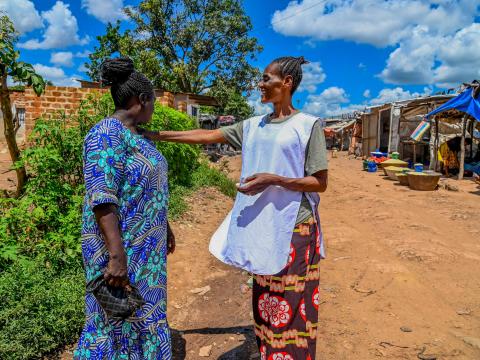DR Congo: Chantal Ilunga: A Hidden Hero in the Fight Against Cholera

Story collected by Tatiana Ballay, Communications Officer, World Vision
My name is Chantal Ilunga Kabungama. I am 50 years old, married to John Ilunga, and a mother of seven. I live in Simba, a programme area within the Likasi health zone in Haut-Katanga province, Democratic Republic of the Congo. Since 2021, I have served as a Community Health Worker (CHW). I also raise broiler chickens and am an active member of the Maendeleo savings group, created in our community thanks to World Vision.
I joined the Community Health Worker network out of conviction. Over the years, our community has faced numerous health crises: cholera, malaria, typhoid, measles, and malnutrition. My sister once fell ill, mainly due to a lack of awareness about hygiene. This situation changed everything for me. I realized that to inform is to protect. From that point on, I chose not to remain silent.
When Cholera Strikes, I Rise
In January 2025, cholera reappeared in Simba. When the first cases were reported, I felt a wave of fear and anxiety. I knew how quickly cholera could kill. Rumors spread faster than facts. Some believed the illness was caused by witchcraft; others thought victims had been poisoned. Families distanced themselves from the sick, while basic hygiene continued to be ignored.
Fortunately, my Community Health Worker (CHW) training with World Vision had prepared me for this. I had learned about case management, nutrition, disinfection, and hygiene promotion. I was quickly deployed into the field with a megaphone and a mission: educate the people about the five critical moments for handwashing, demonstrate water treatment techniques, and identify suspected cases.
Each morning, I received my supplies and assignments after the daily health zone briefing, then set out to reach 50 households a day. We were only 22 CHWs for over 22,000 people. It was exhausting. We lacked sprayers, visibility materials, transport, and sometimes even chlorine. But giving up was never an option.
Two Lives Saved, and One Powerful Message
I will never forget Mama Petronie and her daughter. In March 2025, I was conducting a household awareness session in their neighborhood when I found them weak, vomiting, and suffering from diarrhea. They believed it was a spiritual attack, but my training told me otherwise; these were clear signs of cholera. I arranged for their immediate transfer to the DACO Cholera Treatment Centre.
A few days later, they had fully recovered. Today, they strictly follow hygiene practices and even help raise awareness in their community. That experience proved that my work matters. You don’t need a white coat to save a life just timely, accurate information.
What Cholera Reveals: A Water and Sanitation Crisis
Cholera didn’t return to Simba by chance. It came back because the conditions that enable its spread never left. In our area, people draw water from open, unprotected sources, often shared with animals. There is only one working borehole built by World Vision in 2017, which can’t meet the needs of our growing population.
Families fight for a few jerrycans of clean water. When it runs out, they resort to open wells or stagnant streams. That water is often murky and contaminated. Many households lack latrines, drainage systems, or handwashing stations. Even some schools and churches have no safe toilets. In these conditions, how can we talk about hygiene?
Our population is growing. Neighborhoods are expanding. But access to safe water and sanitation remains nearly stagnant. Cholera keeps returning not because we forget it, but because we never truly shut the door on it.
Changing Behavior, One Gesture at a Time
Thanks to World Vision’s support, our health zone recorded 106 cholera cases, including six deaths. But we also disinfected 2,120 households, educated 18,758 people, trained 36 teachers, and involved 62 sponsored children in awareness efforts. Behavior is changing slowly but surely. Today,
families listen. They call me. They report suspected cases. Even the children recognize me:
"Mama Chantal with the soap," they say.
What I’ve Learned
Being a RECO is more than a role. It’s a daily battle, often unrecognized, unpaid, in the rain, and misunderstood. But it’s a battle that saves lives. I’ve learned that quiet, committed work can transform a whole community.
I continue this work because as long as even one person doesn’t know that handwashing can save lives, my mission is not over.
My Message
To my fellow Community Health Workers: Don’t give up. Even when we’re tired, under-equipped, and overlooked, we are the first line of defense between disease and our families.
To donors and partners: Thank you. Your support empowers women like me to act.
To the world: Hygiene is not just a habit, it’s a matter of survival. I may not be the kind of hero you see on television. But here in my community, I stand firm with my voice, my actions, and my commitment. Because a simple act can save a life. And that, I will never forget.